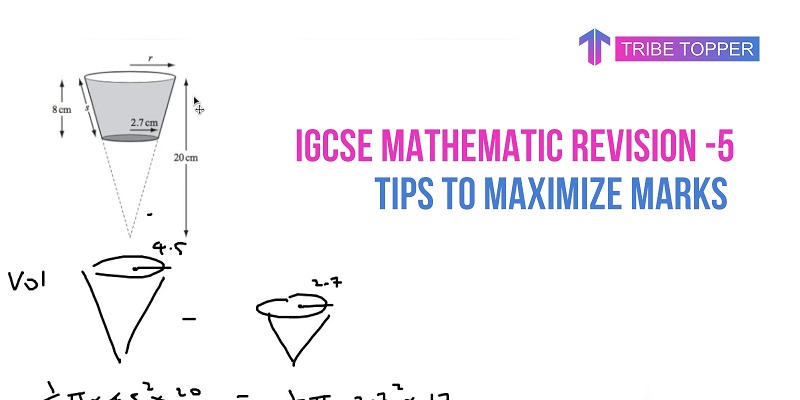IGCSE Mathematics Revision – 5 Tips to Maximize Marks

For many students, the beginning of IGCSE math revision is an extremely stressful and anxious time. IGCSE math is a required subject that students take together with other topics. They are more afraid of IGCSE math than other courses, though. On the other hand, some pupils also enjoy studying for the IGCSE math exam.
In a nutshell, it’s a really difficult subject, thus every student must put in their best effort. Additionally, to improve their scores by practicing IGCSE Past Paper, students have tried a variety of revision and study strategies over the years.
THEREFORE, HERE ARE THE TOP 5 IGCSE MATH REVISION TIPS FOR GETTING BETTER RESULTS ON YOUR IGCSE MATH EXAM.
BREAKDOWNS AND FORMULAS
Many students believe that math is not a topic for taking notes. Instead, it’s all about practice and problem-solving. While the latter is accurate, taking notes is also an important part of IGCSE math.
Additionally, you must take notes while performing IGCSE math revision if you didn’t the entire time. Taking notes lets the student jot down all the crucial facts, equations, procedures, and examples. It makes the study period more fruitful.
Some key concepts or formulas must be used in every IGCSE math chapter. A teacher, tutor, or course supervisor typically provides math notes. These notes are provided to students to aid in their understanding of the chapter being taught.
Math notes are typically brief and to the point because solving problems requires more time. That does not, however, imply that the messages are unimportant or do not need to be changed. Updating the notes will help students comprehend the chapter more fully. Additionally, notes can guide pupils on how to solve the chapter’s issues.
KNOW YOUR WEAKNESS:
Making the most of your limited study time before the examinations is generally a good idea because you only have so much time to prepare. Planning your revision requires identifying the areas where you must put in the greatest effort. We’re not advocating ignoring your strengths since that would be foolish. Note down all the topics in which you are weak. This will help you with time distribution. For example, if you are weak in trigonometry but know algebra well. So, you can allot more time to prepare for trigonometry than algebra.
IGCSE MATHS PAST PAPER REVIEW
Practice again and again…
All pupils have probably heard these phrases from their professors, parents, and tutors. In essence, you get better at arithmetic the more you do it. No matter how many books you read, it will always be difficult unless you get down and practice questions. Past-paper practice is the best for IGCSE math revision. Students can obtain a sense of the paper’s format, the questions’ organization, and even how the marks are distributed.
You can easily access the previous year’s question papers from Tribetopper. It is an online platform that can help you in your exam preparation. The benefit of Tribetopper is that all the study materials, mock tests, and previous year’s question papers are easily accessible, giving you lots of time.
THE QUICKEST TIME IS SLOW AND STEADY
Memorizing solutions to math problems the night before a test has no long-term benefit. You might do well on the test, but math is a cumulative subject; your future learning will be based on your past knowledge. For instance, you cannot understand and be able to solve simple linear equations before learning simultaneous equations. You can only solve simple linear equations after obeying and comprehending simple arithmetic laws. You might think of it as building a house: before you create the foundation, you must first make the roof. Difficult topics are always constructed on the foundations of simpler ones.
IDENTIFYING CRUCIAL POINTS, PATTERNS, AND SOLUTIONS
Math is mostly about patterns and essential ideas that students must remember and utilize to locate the answers. Every IGCSE Maths Mock Paper, including Equations, Algebra, and Graphs, has a pattern and a common approach to problem-solving.
Once pupils have mastered that process, answering questions will come naturally. No matter how challenging the question is, students must comprehend the fundamental steps involved in solving it. This develops through practice and haste when employing all the procedures to determine a potential answer.
Pattern and timing of questions on the IGCSE Maths Paper
Every IGCSE math paper follows the same format. Starting with simple problems requiring little thought and time, we go on to more difficult issues requiring more time. To master time management, practicing prior papers in a timed setting is important. You can then choose which questions need more time and which you can complete quickly.